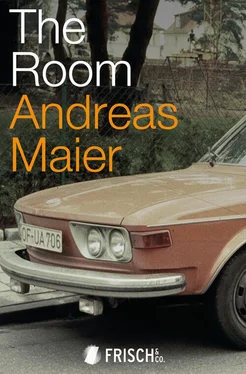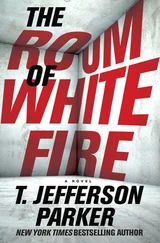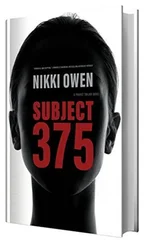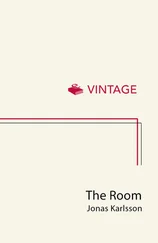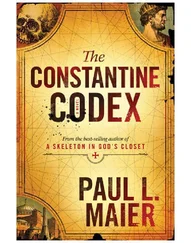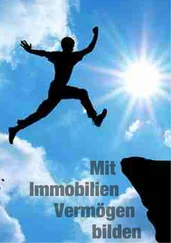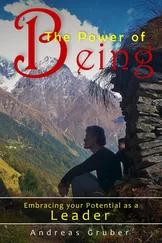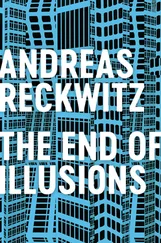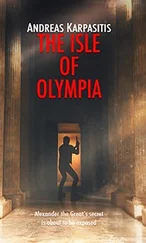A few seconds later my uncle drives on, and the curious build-up of traffic that was hitherto unknown dissipates again, all the cars jolting forwards and streaming north and south and into smaller side streets too, and after just a few seconds there’s nothing left of what there was moments before. Instead, like there always used to be, there is just one automobile on the Kaiserstrasse, or even two here and there, But what happened just now? they ask themselves on the Kaiserstrasse in bewilderment. Hmm , mumbles the Dunkel landlord, giving the Kaiserstrasse one last thoughtful glance before going back in to pull pints. As he does so, he wonders whether he should tell the Dunkel guests on the other side of the bar about what he just experienced, but at the same moment realises that he lacks the words to do so, and that in any case it can’t be told, because he himself can’t even grasp what just happened, and what’s more, he doesn’t even know for sure if anything did, in fact, happen. Old Herr Doktor Herrmann bids farewell to Usinger the poet, propping his hands against his sides, a little more hunched now and with two new wrinkles next to his nose that he didn’t have before, then goes back into his bookshop at exactly the same time as Herr Lenhardt steps into his shop fifty metres away. The two Rausch men go back into the Linde, where three schnitzels are waiting in the dumbwaiter — to be brought to the table by old Herr Rausch, while Erwin, the son, folds serviettes. Herr Schifbenger goes off to drink a coffee in his competitor’s establishment. Gradually, all the Friedbergers disappear back into their houses and behind their windows, and my uncle is already on his way back to Bad Nauheim with my mother and the Variant, the Kaiserstrasse is quiet again, undisturbed and peaceful like it always used to be. The only one left is Usinger the poet, who can be seen disappearing through the gate of the great castle in his old tail coat with the stack of books under his arm, as if he came from a completely different era and had just been painted into the scene by Carl Spitzweg under the title: The Cosmological Poet Disappears into his Castle .
J heads straight for Bad Nauheim, dropping my mother off at her then-apartment. After that, he drives directly to Uhlandstrasse, hurriedly eats the early dinner that is waiting there for him, and takes his mother to the hairdresser’s. Then he drives quickly to Schade & Füllgrabe and buys a vast quantity of preserving sugar which he brings back to Uhlandstrasse, where, or so it seems to him, there’s a veritable warehouse of fruit waiting to be preserved in the cellar. The more his mother preserves, the more fruit there seems to be. The majority of it comes from the company grounds. Pears, plums, squash, and above all apples. And now all of a sudden it’s six in the evening and everything has been done, and my uncle, having almost given up all hope (and having unleashed a thousand blood baths in his mind) sets off at last from Uhlandstrasse to Forsthaus Winterstein.
First he drives through the town, and after just a few metres he sees the sign for an inn, perhaps one that he, the Boll-heir, hasn’t shown himself in for a while. He could pop in, parking the car in a prestigious manner first, then appear in the doorway so that everyone will look up, recognise him at once and be pleased. A guest of his standing! But then he sees the sign for another inn, and then a third, for there are inns and bars everywhere in Bad Nauheim because of the numerous spa guests. So my uncle decides to drive up to the forest after all; he wants to be amongst the robins, which start to sing shortly before dusk. As dusk falls, the wild animals begin to venture out of their dens. He can walk along the forest path in sturdy shoes with a forest-appropriate jacket, almost like the hunters. This makes J feel orderly and proper. So it turns out he does have a uniform after all, a forest uniform. He always has the cumbersome old binoculars with him when he comes here. There in the forest it’s as though his eyes were protruding for sheer joy, and then the old binoculars protruding in turn. My uncle was one of those people who manage to effortlessly lure squirrels to eat from their bare hands; he must have had some kind of special technique. To start with I was astounded, because never in a million years would I have thought that he could manage such a feat, instead believing that the only result of him laying a nut in his flat, outstretched palm would be that all the squirrels flee from him in shock and create a no-go zone, so to speak, of at least fifty metres around him, all the squirrels in the Bad Nauheim forest and the spa parklands, and all the wildlife in Wetterau for that matter. But they came to my uncle willingly, despite the fact that he looked so awful, with his lower jaw jutting out and, as the years passed, increasingly hunch-backed as he stood there waiting for the squirrels.
He drives up the main road and veers off through the narrow lanes of the old town, and if we can agree on the fact that it’s the beginning of autumn in the year of the moon landing on this day in the life of my uncle J, then he encounters a trailer in front of him in Keltergasse and can’t get past it. The trailer is full of apples, and it’s in the process of being backed in to the courtyard. On the tractor sits a man, a boy stands alongside it, and in front there is a woman guiding the driver backwards. Careful, calls the man. J knows him, of course, his name is Karl Maiwald, the boy is his son Martin, and the woman is Karl’s wife Christine. J stops the car and gets out to watch them bring the trailer into the yard, they still need to make it around the corner. The Maiwald family has a daughter too, called Julia, but she is nowhere to be seen. Before they are even a third of the way around the corner, the rear plank of the trailer swings open and some of the apples fall out. Maiwald brakes, pulls on the handbrake and slowly climbs down from the tractor. Then he leans against the trailer and asks who the last person to secure the hatch was. Your son, calls the wife. Meanwhile, some of the apples start to roll down Keltergasse, directly towards my uncle. The apples, calls J, and he begins to pick some of them up. But not many of them roll down the street, most stay in the yard. Julia Maiwald appears briefly at the yard gate, then immediately disappears again. A laugh and a drawn-out exclamation of ay-ay-ay rings out from the courtyard.
J goes up to Maiwald and says, Here, the apples.
So Martin secured the load, says Maiwald, throwing the apples from J’s hand back onto the trailer.
J now sees that around a third of the load is lying on the ground by the gate, that Julia Maiwald is standing behind the load and that Gerd Bornträger is there in the Maiwald’s yard too, sitting on a bench with an empty jerry can in his hand.
Hey there J, calls Bornträger, it looks like everyone’s gathering around the apples again!
The apple-pressing has been taking place in the Maiwald’s yard for some days now, and Bornträger, who happens to live in the old town, has come to fetch some cider. During the apple-pressing season, the Maiwald’s yard becomes a mecca for the whole neighbourhood, and even in the Apollo year the people come with their bottles and jerry cans, just like always. While Bornträger remains seated (putting his jerry can down next to him on the ground), Christine fetches some baskets and Martin the pitchfork. They shovel the apples into the baskets, then empty the baskets into the now-secured trailer. Julia picks them by hand, apple by apple, and Bornträger watches her (as does J).
If you want sweet ones, says Maiwald to J (seeming not to notice that J is staring at his daughter), then we pressed yesterday. Not today, today we were picking.
Читать дальше
